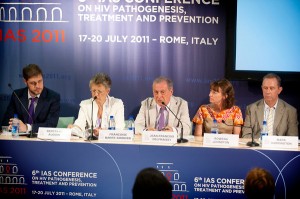Members of the Advisory Board for a global scientific strategy “Towards an HIV Cure” today launched the Rome Statement for an HIV Cure calling for an acceleration of HIV cure research. The announcement was made at the 6th IAS Conference on HIV Pathogenesis, Treatment and Prevention (IAS 2011) held in Rome.
Recent scientific advances in HIV research have led to a re-emergence of interest and optimism in prospects of at least a functional cure for HIV. The development of a functional cure which, without completely eliminating the virus from the body, would permanently suppress its replication and considerably diminish viral reservoirs, possibly leading to the long-term remission of patients.
Under the auspices of the International AIDS Society, a group of internationally recognized scientists and stakeholders is guiding the development of a global scientific strategy “Towards an HIV Cure”. The strategy aims at building a global consensus on the state of HIV reservoirs research and defining scientific priorities that need to be addressed by future research to tackle HIV persistence in patients undergoing antiretroviral therapy. The strategy will be presented at the XIX International AIDS Conference (AIDS 2012) which will be held in Washington DC from 22-27 July 2012.
The International Scientific Working Group is co-chaired by Professor Françoise Barré-Sinoussi, IAS President-Elect and 2008 Nobel Laureate for Medicine, and Professor Steve Deeks, University of California, San Francisco (UCSF) and Positive Health Program (AIDS Program) at San Francisco General Hospital. The working group works closely with an advisory board composed of leading advocates and major research stakeholders in HIV cure, including representatives of people living with HIV and funders and clinicians from high prevalence settings. The Advisory Board is co-chaired by Prof. Barré-Sinoussi and Dr. Jack Whitescarver, Associate Director for AIDS Research and Director of the Office of AIDS Research at the National Institutes of Health.
“While there is certainly a high level of interest being expressed about finding a functional HIV cure (2), it can only be achieved through an increased and concerted international effort engaging not only the scientific community but all stakeholders involved in the HIV/AIDS response and global health,” said Professor Barré-Sinoussi.
“Partnership and collaboration are critical to the efforts to find an HIV cure,” said Dr. Whitescarver. “We need not only the finest minds but the very best in scientific alliances.”
Today’s Rome Statement for an HIV Cure lists the following three key objectives:
- recognizing the importance of developing a safe, accessible and scalable HIV cure as a therapeutic and preventive strategy against HIV infection and to help control the AIDS epidemic.
- committing to stimulating international and multidisciplinary research collaborations in the field of HIV cure research.
- encouraging other stakeholders, international leaders and organizations to contribute to accelerating HIV cure research through their own initiatives and/or by endorsing this statement and supporting the alliance that the Advisory Board is building.
STATEMENT
The year 2011 marks 30 years since the first AIDS cases were reported. During these three decades significant progress has been made in the global response against the HIV/AIDS epidemic. In particular, development of efficient antiretroviral drugs and their expanding availability have ensured that millions of people living with HIV live a healthy life. Today, more than six million people from low-and-middle-income countries receive antiretroviral treatment , a more than 10-fold increase in less than a decade
Nevertheless, while the benefit of antiretroviral treatment is irrefutable, the maintenance of a persistent infection in patients despite years of antiretroviral therapy precludes any discontinuation of treatment. This life-long requirement is both an individual and public health burden. In addition, for every person starting antiretroviral treatment, two new infections occur . In a context of global economic crisis with the resulting pressure on international funding of the HIV/AIDS response, the long-term sustainability of treatment rollout is in jeopardy. The recent change in the WHO guidelines recommending an earlier initiation of HIV treatment makes the situation even more challenging. Investments to develop new therapeutic strategies that will ultimately allow HIV infected patients to discontinue their treatment are of the utmost urgency.
Recent scientific advances in HIV research have led to a re-emergence of interest and optimism in the prospects of a cure for HIV. The development of, at least, a functional cure that, without completely eliminating the virus from the body, would permanently suppress its replication and considerably diminish viral reservoirs, possibly leading to the long-term remission of patients. Not only would such a strategy act as therapy at the individual level but, considering the growing evidence that HIV transmission is dramatically reduced in the absence of detectable viral load, it would most probably contribute to HIV prevention at the population level. Nevertheless, these efforts should come in addition to the current treatment rollout and prevention strategies.
A functional HIV cure can only be achieved through an increased and concerted international effort engaging not only the scientific community but all stakeholders involved in the HIV/AIDS response and global health.
Under the auspices of the International AIDS Society, a group of internationally recognized scientists and stakeholders is guiding the development of a global scientific strategy “Towards an HIV Cure”. The strategy aims at building a global consensus on the state of the HIV reservoirs research and defining scientific priorities that need to be addressed by future research to tackle HIV persistence in patients undergoing antiretroviral therapy.
As members of the Advisory Board of the Towards an HIV Cure:
- We recognize the importance of developing a safe, accessible and scalable HIV cure as a therapeutic and preventive strategy against HIV infection and to help control the AIDS epidemic.
- We are committed to stimulating international and multidisciplinary research collaborations in the field of HIV cure research.
- We encourage other stakeholders, international leaders and organizations to contribute to accelerating HIV cure research through their own initiatives and/or by endorsing this statement and supporting the alliance we are building.
Now, more than ever, it is time to seriously start looking for an HIV cure.

